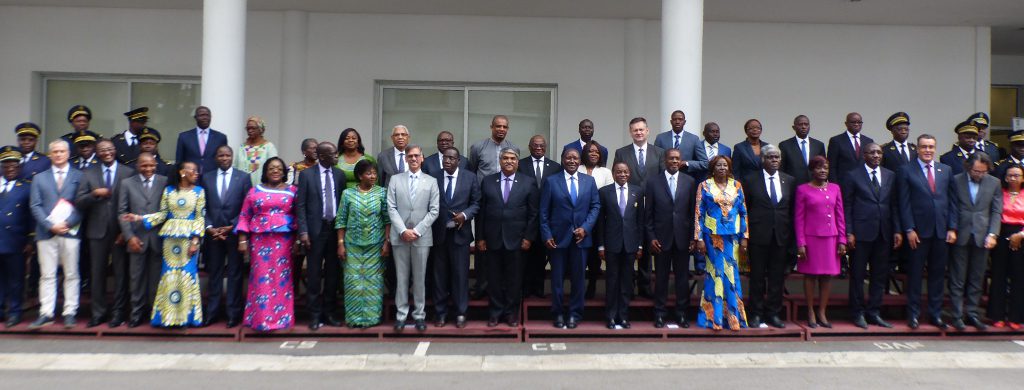
The government of Côte d’Ivoire launched its Zero Hunger Roadmap on 12 February. The document presents the strategic review of the country’s initiatives to strengthen national efforts to achieve Zero Hunger by 2030, assesses the status of food security, analyses advances and gaps of existing policies and programmes, and proposes strategic recommendations.
The document was launched by vice-president Daniel Kablan Duncan during an event with senior members of the government, including ministers and mayors, ambassadors and other members of the diplomatic services, and representatives of the private sector. The United Nations agencies were represented by the resident coordinator, Babacar Cisse. Manoj Junega, assistant executive director, represented the World Food Programme.
Ceremony
The Zero Hunger Review report was presented during the event. The report highlights achievements and gaps of Côte d’Ivoire in ensuring food security for all. The country still has 12,8 percent of its population food insecure. However, because of the policies and programmes in place, this percentage has been decreasing.
The report and the Zero Hunger Roadmap were prepared with support from WFP and other partners. The WFP country office was one of the main supporters of this process and worked closely with different sectors of the government. WFP country director Adeyinka Badejo and her team accompanied the government in the regional and national consultations and supported the research institution that conducted the study, CAPEC (Cellule d’Analyse de Politiques Economiques du CIRES).
The director of the regional bureau for West and Central Africa, Abdou Dieng, and the country director for Côte d’Ivoire, Adeyinka Badejo, also attended the event. The WFP Centre of Excellence against Hunger was represented by deputy director Peter Rodrigues.
“The government has adopted a multi-sectorial nutrition plan from 2016 to 2020 to fight malnutrition and ensure an optimal nutrition status for the entire population”, said vice-president Duncan. He also stated that, “This roadmap is a strategy that includes all national policies and that must be used like a compass to guide the effective and efficient implementation of all governmental initiatives that aim to promote sustainable and inclusive growth”. Côte d’Ivoire’s policies to eliminate hunger by 2025 are excellent”, said WFP assistant executive director Junega.
A delegation from Côte d’Ivoire was in Brazil on 13-15 December to strengthen knowledge exchange with Brazil in the areas of school feeding, food security, and social protection. Under the leadership of vice-president Duncan, the delegation met with several Brazilian authorities to learn about the policies that integrate Brazil’s strategy to ensure food security, rural development and nutrition. “We hope to learn from the Brazilian experience and, as very good students, we want to learn so much that we will be able to also teach about school feeding,” said vice-president Duncan at the time.
The study visit of Côte d’Ivoire was organized by the WFP Centre of Excellence against Hunger, the World Food Programme country office in Côte d’Ivoire, and the Brazilian Cooperation Agency.
The roadmap
Côte d’Ivoire has a series of plans and programmes in place to achieve Zero Hunger. The National Multi-Sectorial Nutrition Plan, the National School Feeding Strategy, and the National Programme for Agricultural Investments are some of them. School feeding plays an important role in the fight against all forms of malnutrition. WFP provides balanced daily school meals to 571,000 primary children in the country, and the government has a vision to create one school canteen for each school, and one group of smallholder farmers to supply food for each school canteen.
The Zero Hunger Roadmap points out some global challenges that Côte d’Ivoire shall face to fight hunger: coordination of programmes, operationalization of programmes, monitoring and evaluation, capacity strengthening, funding, and gender gaps. The document also stresses some challenges in specific sectors: agricultural development, climate change, nutrition, and social protection.
To overcome these challenges, the roadmap proposes a series of recommendations and an action plan. The goal is to accelerate the implementation of sectorial programmes to achieve food security and eliminate all forms of malnutrition.
The action plan involves a wide range of multi-sectorial activities that address the creation of value chain for agriculture, development of infrastructures, access to water, dissemination of good practices in nutrition, incentives to local food procurement for governmental programmes, and school feeding.




